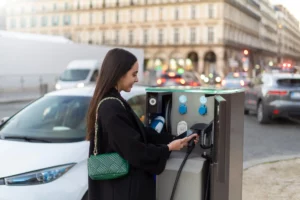
Home / EV Charging News / Innovative Solutions for Residential Electric Car Charging
Electric vehicles (EVs) have emerged as a prominent solution to reduce carbon emissions and combat climate change. As EV adoption continues to rise, the need for efficient and convenient residential charging solutions becomes increasingly important. In this comprehensive guide, we explore innovative solutions for residential electric car charging, from basic Level 1 charging to advanced smart charging technologies and sustainable energy integration.
Residential electric car charging is a vital aspect of EV ownership, providing convenience and accessibility for daily charging needs. With the growing popularity of EVs, innovative solutions have emerged to enhance the residential charging experience.
Level 1 charging involves using a standard household outlet (120 volts) to charge an electric vehicle. While Level 1 charging is the most basic option, it offers widespread accessibility, allowing EV owners to charge their vehicles using existing electrical infrastructure at home.
Level 2 charging utilizes a dedicated 240-volt outlet or home charging station, providing faster charging speeds compared to Level 1. This solution is suitable for EV owners who require quicker charging times and greater flexibility in their charging routine.
Smart charging technologies have revolutionized residential EV charging by offering advanced features such as scheduling, remote monitoring, and energy management. These solutions enable EV owners to optimize charging times, reduce energy costs, and integrate their charging schedule with off-peak electricity rates.
Integrating solar panels with residential EV charging infrastructure is a sustainable solution that reduces dependency on the grid and promotes renewable energy use. Solar-powered charging systems harness sunlight to charge EVs, offering environmental benefits and potential cost savings over time.
Battery storage systems combined with residential EV chargers provide additional benefits such as energy optimization, backup power during outages, and grid independence. These integrated solutions contribute to energy resilience and support sustainable practices at the residential level.
Wireless charging technology eliminates the need for physical cables, offering convenience and ease of use for residential EV charging. Wireless charging systems use electromagnetic fields to transfer energy to EVs, reducing wear on charging cables and enhancing the overall charging experience.
V2H and V2G capabilities allow EV owners to use their vehicles as energy storage units or feed energy back into the grid when needed. These solutions promote energy resilience, grid stability, and potential cost savings by leveraging EV batteries for broader energy management purposes.
Integrating EV chargers with home automation systems offers added convenience and control over the charging process. Features such as energy monitoring, smart scheduling based on energy demand, and user-friendly interfaces enhance the overall user experience and promote efficient energy use.
Considerations for EV owners regarding the accessibility and affordability of residential charging options play a crucial role in adoption. Factors such as installation costs, government incentives, and future scalability influence the choice of charging solutions for residential settings.
Residential electric car charging solutions contribute significantly to reducing greenhouse gas emissions, promoting renewable energy integration, and supporting sustainability goals. By adopting innovative charging technologies and sustainable energy practices, EV owners can make a positive impact on the environment.
Innovative solutions for residential electric car charging play a pivotal role in accelerating the transition to sustainable transportation. From basic Level 1 charging to advanced smart and solar-powered systems, these solutions offer convenience, efficiency, and environmental benefits. As technology continues to evolve, embracing innovative charging solutions is key to building a greener and more sustainable future for electric mobility.
